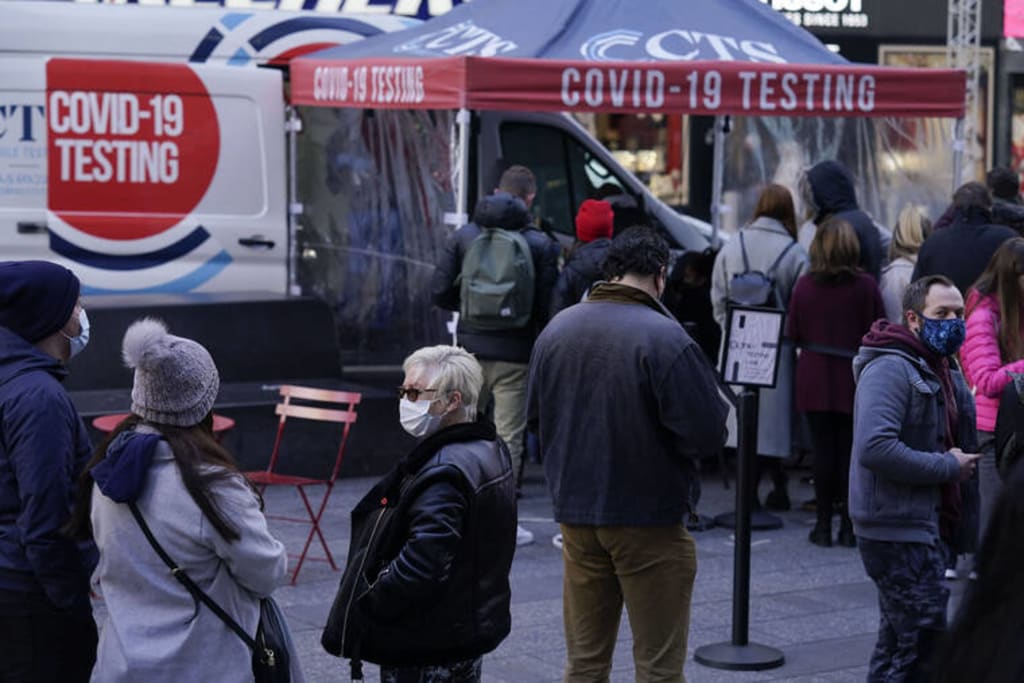As omicron advances, the United States is facing a twin coronavirus outbreak.
omicron advances

The new omicron coronavirus mutant sweeping the globe could unleash yet another wave of turmoil, putting medical personnel under even more strain as they deal with a rise in delta cases and upsetting Christmas preparations for the second year in a row.
The White House today claimed that a lockdown is unnecessary since immunizations are readily accessible and appear to protect against the virus's worst effects. Even though omicron is milder overall than delta, it may disable some of the existing life-saving measures, putting immune-compromised and elderly individuals in particular at danger as it launches a swift assault on the US.
"Our delta surge is still running strong, and it's getting stronger." Dr. Jacob Lemieux, who analyzes variations for a Harvard Medical School-led research team, added, "And on top of that, we're going to add an omicron surge."
"This is concerning, because our hospitals are already overburdened. Staff is exhausted, leaving little capacity for a possible COVID-19 case crush caused by an omicron wave superimposed on a delta surge.
At a news conference on Tuesday, he and other specialists predicted that an omicron outbreak is already underway in the United States, with the newest mutant coronavirus outperforming the country's capacity to detect it.
The Centers for Disease Control and Prevention said omicron accounted for around 3% of genetically sequenced coronaviruses nationwide, based on samples obtained last week. The largest percentage — 13 percent — was found in the New York/New Jersey area.
These figures are likely underestimates, according to Harvard scientists, since omicron moves so quickly that monitoring measures can't keep up.
Omicron has been confirmed in over 75 countries across the world. The variation has been found in 36 states across the United States. Meanwhile, delta is on the rise across the country, with hotspots in New England and the upper Midwest. New Hampshire, Rhode Island, Michigan, Minnesota, and Vermont had the highest two-week rolling average of cases per 100,000 inhabitants.
Universities are closing classrooms unexpectedly during finals week, causing diseases to spread quickly. The NBA has canceled games, and the NFL has seen its worst two-day epidemic since the outbreak began, with scores of players ill.
Outside of the United States, the European Union's president predicted that omicron will become the dominant form in a month and that "once again, the epidemic would overwhelm this Christmas."
Scientists from all around the world are rushing to figure out what's wrong with omicron, which has a slew of alarming abnormalities in key parts of its genetic structure that might alter how successfully it spreads from person to person. The "doubling time," or how rapidly the number of cases doubles, might offer an indication of the disease burden in a few weeks.
Early evidence shows that omicron is more transmissible than delta, with a doubling duration of around two days, according to CDC Director Rochelle Walensky.
In the United Kingdom, where omicron cases double every two to three days, the variety is likely to overtake delta as the most common strain.
Bronwyn MacInnis, head of pathogen genomic surveillance at the Broad Institute of MIT and Harvard, said, "The statistics out of the UK are extremely disturbing at this stage," and foretell what's to come in the United States. According to her, omicron was already the most popular type in London by Tuesday afternoon.
Omicron is still a mystery in many aspects. It may cause less severe sickness than delta, but it may be better at evading immunizations, according to evidence coming from South Africa, where it was originally detected.
"We don't know much more about this variety than we do," MacInnis said, "including the severity."
At the same time, according to Lemieux, there appear to be less instruments available to combat it. In lab testing, certain monoclonal antibody therapies don't seem to perform as effectively against omicron, according to Lemieux. Vaccines appear to provide less protection, while additional injections, according to CDC officials, improve that protection.
About the Creator
Enjoyed the story? Support the Creator.
Subscribe for free to receive all their stories in your feed. You could also pledge your support or give them a one-off tip, letting them know you appreciate their work.






Comments
There are no comments for this story
Be the first to respond and start the conversation.